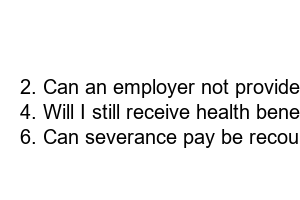퇴직금 조회
Title: Understanding Severance Pay: Everything You Need to Know
Introduction:
Severance pay is a topic that often pops up when discussing job terminations. It’s important to understand what exactly severance pay entails to have a clear perspective on this aspect of an employment agreement. In this blog post, we will dive into the intricacies of severance pay, its purpose, eligibility, and more.
1. What is Severance Pay?
Severance pay is a financial package provided to employees who are facing job termination due to various reasons, such as company layoffs, downsizing, or when an employee voluntarily leaves under specific circumstances. Essentially, it serves as a form of compensation to support individuals through their transition period.
2. How is Severance Pay Determined?
Severance pay is usually calculated based on specific criteria, including the length of employment, the employee’s position, and sometimes even the reason for termination. Factors such as salary, bonuses, and fringe benefits are also taken into account. In some cases, severance pay may be determined by negotiating with the employer or following the terms stated in an employment contract or company policy.
3. Who is Eligible for Severance Pay?
Eligibility for severance pay can vary depending on company policies, local labor laws, and the terms of an employment contract. While not all employees may be entitled to severance pay, it is often offered to individuals who have been employed with a company for a certain period or have been let go due to extenuating circumstances beyond their control.
4. Is Severance Pay Mandatory?
In most countries, including the United States, severance pay is not legally required by labor laws. It is typically at the employer’s discretion. However, there may be instances where employers are mandated to provide severance pay, such as in cases of mass layoffs or certain labor law provisions.
5. Can Severance Pay be Negotiated?
When facing job termination, negotiating severance pay can be an option for employees. Depending on the circumstances and the strength of their bargaining power, individuals can discuss and potentially enhance the financial benefits associated with severance pay. It is essential to consult with an employment lawyer or seek professional advice during negotiation processes.
6. How Does Severance Pay Affect Unemployment Benefits?
Severance pay can impact an individual’s eligibility and the amount of unemployment benefits they receive. It is important to understand the local regulations and consult with relevant authorities or experts to minimize any potential complications when navigating these two aspects.
Summary:
Severance pay plays a vital role in providing financial support to employees during a job termination period. Whether it is an employer’s obligation or a result of negotiations, understanding the ins and outs of severance pay can help individuals secure a better package. Eligibility, negotiation possibilities, and its potential impact on unemployment benefits should be carefully considered. Seeking professional advice and being aware of your rights will undoubtedly assist you in navigating this critical phase of your work life effectively.
FAQs:
1. What rights do I have regarding severance pay?
2. Can an employer not provide severance pay at all?
3. How is severance pay taxed?
4. Will I still receive health benefits during the severance period?
5. Is there a specific timeframe to claim my severance pay?
6. Can severance pay be recouped if I find new employment quickly?

